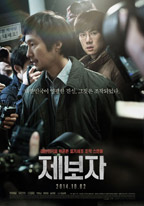

Je-bo-ja
South Korea 2014
Genre:
Thriller, Drama
Director:
Lim Soon-rye
Cast:
Park Hae-il
Lee Kyeong-yeong
Yoo Yeon-seok
Park Won-sang
Song Ha-yoon
Ryoo Hyeon-kyeong
Kim Kang-hyeon
Kim Soo-an
Park Yong-soo
Kwon Hae-hyo
Jang Gwang

Whistle Blower
Story: Yoon Min-cheol (Park Hae-il) has a news show and is looking for a new scoop. He finds out that a famous sterility clinic gets its
ovum illegally. But his superior Lee (Park Won-sang) holds Yoon back since the popular stem cell scientist Lee Jang-hwan (Lee Kyeong-yeong) obtains his
ovum from this very clinic. Lee is Korea's star scientist and the country's beacon of hope since he successfully cloned human embryonic stem cells.
This achievement paves the way for healing incurable diseases. Yoon believes that further investigation wouldn't be worthwhile until suddenly
Sim Min-ho (Yoo Yeon-seok) contacts him. He tells him that he has recently worked under Lee and that Lee hasn't cloned a single stem cell to this date.
His whole work is fabricated and furthermore has been done by unethical means. Yoon and his partner Yi-seul (Song Ha-yoon) investigate the case, but their
investigation garners criticism and scorn by the majority that regards Lee as a national hero.
Review: These days Korean thrillers based on true events that caused an outcry of the general public have almost become sort
of an independent genre. "The Attorney" and "Silenced" count among the most famous entries.
Apparently South Korea is full of corruption and a press that the government can easily put pressure on. That this just isn't right probably can't be
expressed publicly in a successful manner, leading to movies constantly picking up on these problems in the country and wagging the forefinger. The
representative conscience of Korea in the shape of "Whistle Blower" proves to be a smart thriller that counts among the best of its kind. This is mainly
the effort of a story told in all of its complexity without ever making the audience lose track of the events unfolding.

The story is based on the case of scientist Hwang Woo-suk who has caused quite a stir with his fabricated stem cell research in the press across all the globe.
A surprising aspect feautured is that Hwang, resp. Lee in the film, isn't just depicted as an evil person who is solely eager on his success, but who sees
no other choice but to fabricate his research because of the pressure put on him by his country as the new beacon of hope. A delicate subject which is
nonetheless worked into the movie quite well and is also carried by the charismatic Lee Kyeong-yeong ("Kundo",
"National Security") with more layers than you are used to see in this kind of movie. Despite the seemingly impartial
approach to the subject the film goes into an obvious direction in the end in order to stay close to real events, but of course also for dramatic reasons.

Corruption is omnipresent. Lee may express his regret that he simply didn't know when to stop, but on the other hand he is using his friends in high positions
of the media in a very calculating manner to keep his public appearance clean. This sort of foul play and the injustice that results from it for reporter
Yoon is naturally making the viewer angry. Lee can shed as many honest tears as he wants, showing that he actually just wants to help, but the fact remains
that he is resorting to foul play like so many politicians in the country and puts obstacles in the way of the truth. And making you almost even angrier is the
majority of the public, which comes to the defence of Lee and celebrates him as a national hero who you aren't supposed to attack. It seems as if Korea is
still very prone to personality cult and beacons of hope. But there have to be some people who use their own head, right?
Yes, of course. And their playground is the internet. Science always implies that new theories and inventions need to be scrutinized and examined critically.
Despite a astonishingly high percentage of Koreans attending university this sort of academic thinking doesn't seem to have reached most of them yet. Or
the true elite doesn't dare to express their opinion in the public. This is where "Whistle Blower" takes some artistic freedom. After all, some of the exposure
has actually been done on the internet, which in the film is credited to the reporters. Moreover, it's also irritating that the movie, despite its title,
doesn't center around the whistle blower, played by Yoo Yeon-seok ("Hwayi: A Monster Boy"), but the reporters. At least
the talented Park Hae-il ("War of the Arrows") manages to carry the main lead fantastically and emotionally involves
the viewer depite his lack of a private life.

Some of the supporting actors like Song Ha-yoon ("Helpless") also do a fine job, but in the end it is the well written screenplay that stands as the true strength of "Whistle Blower". The story never drags on and there are always new developments and revelations. Female director Lim Soon-rye ("South Bound", "Forever the Moment") succeeds in keeping the plot simple enough without sacrificing the complexity of the political power struggles. This is what makes this thriller extremely worthwhile. The multifacetedness and the high level of tension going hand in hand with the subject manage to be as convincing as the charismatic performances. Moreover, "Whistle Blower" refrains from overdramatization, the kind of which can normally be found in such movies, which deserves some real appreciation.

Disclaimer

















